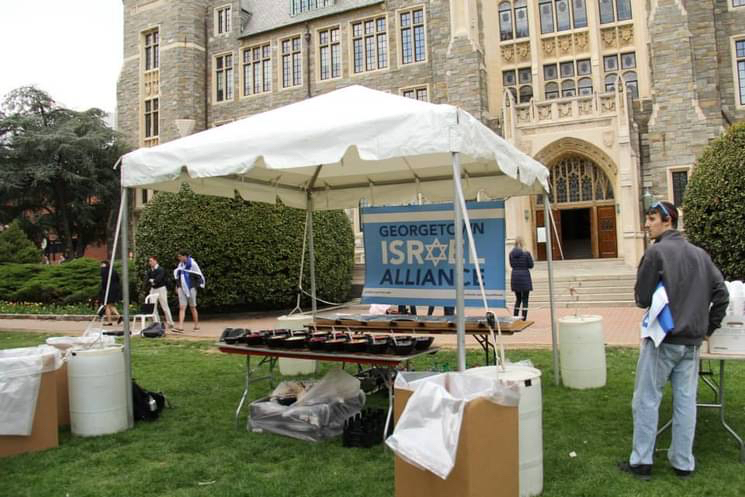Over five years ago, in my first explicitly political piece for Vision Magazine, I criticized North American Jewish community organizations for funding “narrow Israel-related political agendas rather than strengthening the community itself, deepening Jewish identity, advancing Jewish aspirations or facilitating aliya to Israel.”
My criticism was sparked by a debate around Canary Mission and the institutional response to the movement for solidarity with Palestinians on North American campuses.
Today, as we watch US Jews enter crisis mode in response to growing overt anti-Semitism, the widening gap between Washington and Jerusalem, and Israel’s current ongoing multi-front war, it’s become abundantly clear that the hasbara industry’s strategy of “ignoring Jewish national aspirations and questions about the next stages of Jewish liberation… [in favor of dedicating] their energies and resources to merely defending the image and policies of the State of Israel” has failed to protect Israel or North American Jews.
We stand today at a turning point in Jewish American history, maybe the most significant turning point since the 1930s, when US Jews failed to mobilize a communal response to the Holocaust and merely squeaked out a limited and reactionary response only after the Final Solution was put into effect.
Today, Jews appear to have none of the limitations or restraints that Jews faced then – North American Jewry has influence and organization, and is well-established in every stratum of American and Canadian social and political life. But in order to really advance a fitting response to this historic moment, these Jews must first and foremost ask themselves – when push comes to shove, where do our loyalties lie?
If anti-Zionism and anti-Semitism continue to rise in academia, in politics, and in the press; if US and Israeli geopolitical interests become increasingly at odds; if it because less and less feasible to be fully American and fully Jewish; will you choose to be an American, even if it means playing down and hiding your Jewishness in order to assimilate into Americanness, like many Jewish immigrants from Europe in the early 20th Century?
Or is the Jewish continuity that your ancestors risked everything to preserve for over two thousand years of exile more important? Would you be willing to give up the American Dream for it?
For much of the last century, the United States and Canada have been exceptionally welcome homes to the Jews.
In business, entertainment, and even in Torah, North American prosperity has been the backdrop for the communal and cultural thriving of its Jewish minority populations.
As the Ramban teaches in his commentary on Parshat Aḥarei Mot, throughout our exiles, the mitzvot of a Jewish community in any given land provides spiritual strength to the local nation as a whole. But over the last couple decades, as Jewish life in Israel has reached greater heights, the United States, Canada, and their Jews have begun to stagnate.
The American Jewish Dream, the Golden Age born out of the GI Bill and the broad removal of social restraints on Jewish inclusion and upward mobility that followed World War II, has lost some of its glimmer.
For many, being accepted into the fabric of white American society has weakened their attachment to traditional centers of Jewish life that signified their separateness. Additionally, the growing diversity of Jewish theologies and practices that followed a broader liberalizing trend in American religious practice undermined the sense of unity that early immigrants from relatively homogenous backgrounds felt with their “lantzmen.”
As Jewish identity in North America fell back on cultural lowest-common-denominators to maintain some sense of cohesion, the one matter of Jewish identity that consistently succeeded in firing up Jews across the spectrum was support for Israel, especially following the Six Day War. So Jewish institutions, committed to maintaining engagement, not just out of personal interest, but out of a deeply emotional concern for Jewish continuity, poured millions into Zionism. Birthright, AIPAC, StandWithUs, even Canary Mission were all adopted as ways to keep young Jews engaged in the Jewish story, at a time when exclusively Jewish spaces from synagogues to schools to summer camps began to lose their luster for those raised on North American multicultural sensibilities.
But this turn to Zionism proved to be a double edged sword.
By leaning so heavily in the late 20th and early 21st Centuries on a movement that had been revolutionary prior to 1948, and had largely established the dreams of its early ideologues as geopolitical facts, the North American Jewish establishment was playing with a ticking bomb. New generations of Diaspora Jews looking for a dynamic and revolutionary way to advance social change and positively impact history couldn’t be satisfied with annual AIPAC conferences and Federation trips committed to maintaining the status quo of the US-Israel relationship and Jewish political support for Israel.
Those who fully bought into the American Dream, yet held onto Zionism as the central thread of their Jewish identity, could optimistically celebrate the unbreakable bond – in values and interests – between Israel and the West. But two fringes continued to pull away from the outskirts of this camp.
On the one hand, Jews who were raised on the long tradition of radical Jewish activism in the Diaspora, or those who found their own way to these movements as young adults, were unimpressed by the promise of “life, liberty, and the pursuit of happiness,” and became increasingly antagonistic towards the US empire, and the US-aligned understanding of Israel that American Zionists sold them.
On the other hand, Jews who saw Israeli and American interests increasingly at odds, whether from the perspective of our ancient tradition, which teaches that Israel’s success is dependent on the collapse of the fourth empire, or from a critical academic or professional eye on geopolitical developments in the Semitic region, especially after Oslo and 9/11, rejected the American Jewish Dream by leaning into their connection to a more authentic Jewish story far more deeply than the mainstream Zionists.
Like our forefather Avraham, they left their families and their hometowns and moved to Israel. Some served in the IDF. Others studied in Israeli yeshivot or universities. Many then integrated into the Israeli job market. But all of them affirmed that their vision for the Jewish future required them to actually build their lives in the land of the Jews.
Even before Simhat Torah of this year, both of these fringes competed to win over the broader North American Jewish community to their sides, around crises from Charlottesville to COVID to the Israeli judicial reform debate. But in this moment of extreme crisis, as months of war rage in Israel and as North American Jews are caught between anti-American and anti-Israel protest movements that have swept the college campuses that were once a central right-of-passage to Diaspora Jewish identity, it may be time for the majority of North American Jews to finally make a choice.
Where does your future lie?





